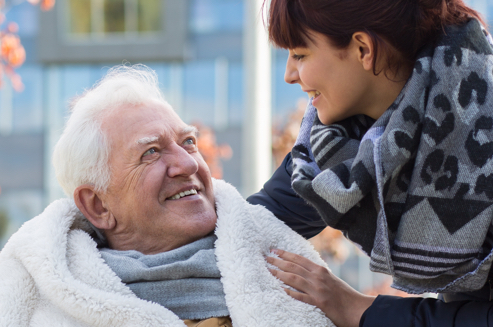
Dangers of Cold Weather for Seniors
Dangers of Cold Weather for Seniors
Older adults lose body heat faster and are less able to tolerate cold than younger adults. If a person’s body temperature drops much below the common base of 98.6 F, dangerous health problems can arise, including increased heart rate and blood pressure, liver damage, and heart attack. Hypothermia sets in when a person’s body temperature goes below 95 F. Left untreated, hypothermia can shut down the body’s heart and respiratory systems and lead to death.
Older people are at the greatest risk for cold-related death — the Centers for Disease Control and Prevention (CDC) consistently reports that more people die from excessive cold than excessive heat. Living inside in intense air conditioning or with inadequate heat can invite hypothermia. Also, older adults with confused thinking may not be self-aware of their dropping body temperature, so caregivers need to be extra vigilant to check for signs of hypothermia including shivering, slurred speech, shallow breathing, and a weak pulse.
Causes of Low Body Temperature
Besides exposure to cold temperatures and moisture, seniors can face a drop in body temperature because of a number of other medical conditions and health factors, including:
- Medications such as beta-blockers, sedatives, antipsychotics, and antidepressants
- Stroke
- Parkinson’s disease
- Hypothyroidism (underactive thyroid)
- Sepsis (widespread infection)
- Malnutrition and anorexia
- Nerve damage
- Alcohol or drug use
- Anesthesia
Susceptibility to cold can be a symptom of medical issues like diabetes or high blood pressure. Because of poor circulation, diabetics run the risk of decreased body temperature in their extremities. They also may not accurately sense temperature changes in their hands and feet, which can cause injury they may not feel. For people with high blood pressure, certain medications such as beta-blockers can reduce blood circulation to the hands and feet, and calcium channel blockers relax the blood vessels, which may accelerate heat loss. Having high cholesterol can also restrict blood flow and lower body temperature.
How to Keep Seniors Warm
Prevention of cold exposure to seniors takes precautionary measures before winter sets in and ongoing observation by family members, caregivers and those familiar with the older loved one’s health and living environment.
These tips can help caregivers keep seniors warm this winter:
- Keep the home properly heated at a temperature of 68 F to 70 F.
- Winterize windows and doors with weather stripping and caulk.
- Close heat vents and shut doors in rooms that are seldom used.
- Dress the senior in warm layers that can be removed if he or she gets too hot.
- Put socks and slippers on the senior and use a blanket over the legs.
- Make sure the senior wears a hat, scarf, and gloves when going outside.
- Check weather reports and know that snow, rain, and wind can increase heat loss.
- Have the senior change out of damp or wet clothes right away.
- Help the senior practice sound nutrition to fuel the body’s heat and energy sources.
- Ensure the senior stays fully hydrated — dry air temperatures inside and outside can cause dehydration.
- Support the senior in eating regular meals to stimulate the body’s own thermostat.
- Encourage the senior to avoid alcohol consumption, which can trigger heat loss.
- Learn the temperature-lowering effect of specific medications and over-the-counter drugs.
- Be aware that some space heaters and fireplaces are fire hazards and can cause carbon monoxide poisoning.
- Devise an evacuation plan in case of a power outage or the furnace/heat source breaks down.
- Create a plan for family and friends to check on the senior regularly, especially during colder weather.
You must be logged in to post a comment.